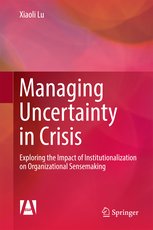
This book studies the variety of organizational strategies selected to cope with critical uncertainties during crises. This research formulates and applies an institutional sense-making model to explain the selection of strategies for coping with uncertainties during crises to answer the question why some organizations select a rule-based strategy to cope with uncertainties, whereas others pursue a more ad hoc-based strategy. It finds that the level of institutionalization does not affect strategy selection in the initial phase of responding to crises; that three rigidity effects can be identified in the selection of sense-making strategies once organizations have faced the failure of their selected strategies; that discontinuities in the feedback loop of sense-making do not necessarily move organizations to switch their sense-making strategies, but interact with institutionalization to contribute to switching sense-making strategies.